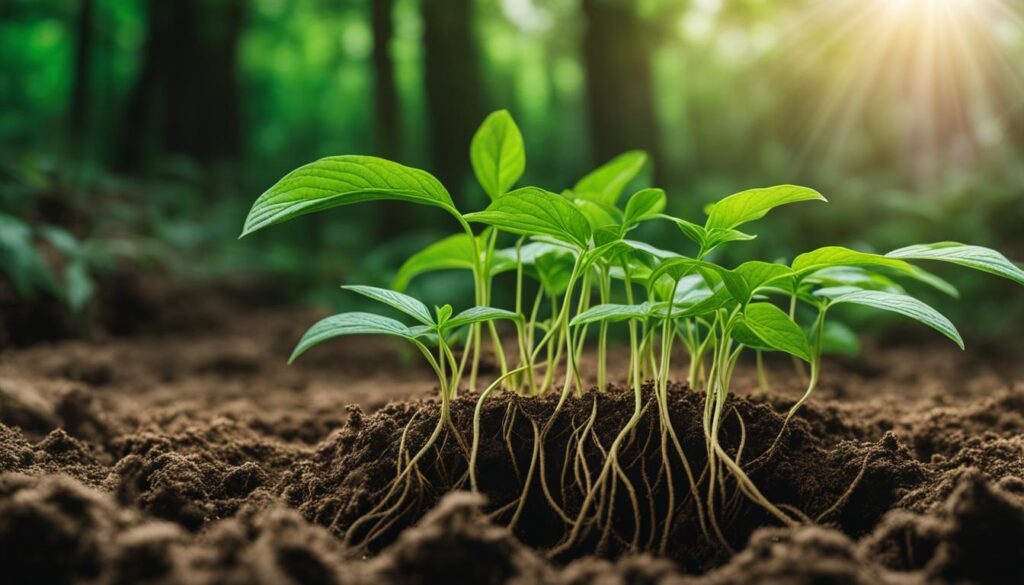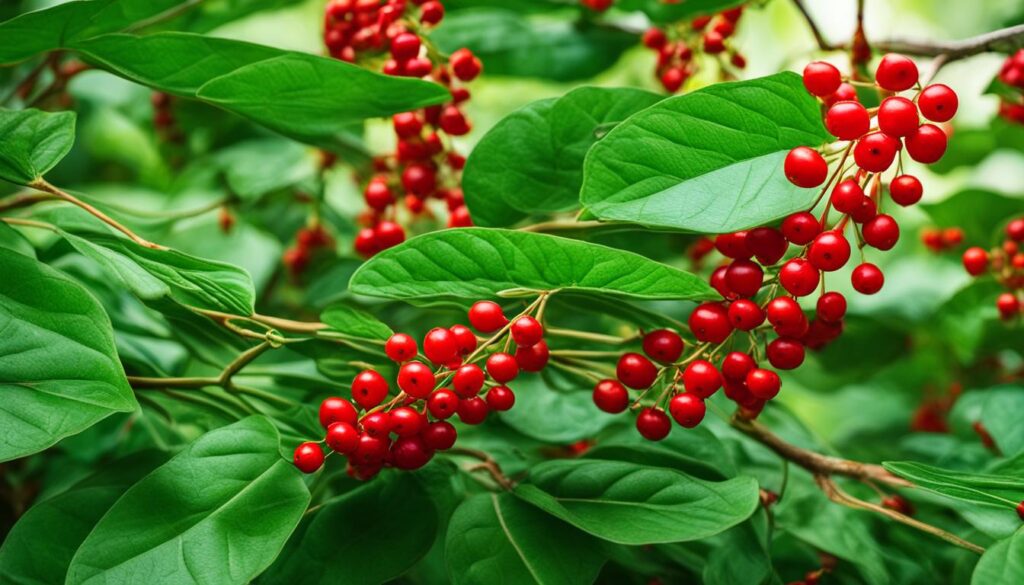Growing Malaysian Ginseng, also known as Tongkat Ali, is a fascinating journey into the rich history and cultivation practices of this tropical herb. Malaysia, with its deep-rooted traditions and advancements in research and development, has become a prominent player in the cultivation and production of high-quality Malaysian Ginseng extract.
Through centuries of indigenous use and ongoing preservation efforts, Malaysian Ginseng has evolved into a sought-after herb known for its medicinal properties. As the demand for clinically proven products grows, Malaysia’s commitment to quality control and safety standards has elevated its reputation as a leader in the cultivation of Malaysian Ginseng.
Key Takeaways:
- Cultivating Malaysian Ginseng requires specific techniques and practices.
- The herb thrives in tropical rainforest conditions with well-drained soil and ample sunlight.
- Sustainable harvesting and quality control measures are crucial for potency and safety.
- Proper care and attention are essential for successful cultivation.
- Malaysia’s advancements in research and commitment to quality have contributed to the rising popularity of Malaysian Ginseng.
A Brief History of Malaysian Ginseng
The history of Malaysian Ginseng, also known as Tongkat Ali, is deeply rooted in the culture and traditions of Malaysia. This tropical herb has been used by the indigenous people, known as Orang Asli, for centuries as a natural remedy for various ailments and to promote overall wellness.
The evolution of Tongkat Ali took place primarily in Malaysia, where the herb thrives in the country’s rich biodiversity and favorable climate. It has been traditionally consumed as a herbal infusion or decoction, believed to enhance vitality, improve libido, and boost energy levels. Over time, Malaysian Ginseng has gained recognition for its potential health benefits and has become an essential part of traditional medicine practices.
Malaysia has played a pivotal role in preserving and cultivating Malaysian Ginseng. The country’s commitment to research and development has resulted in significant advancements in understanding the herb’s properties and potential applications. The cultivation techniques have been refined and improved to ensure the highest quality and potency of Malaysian Ginseng products.
The timeline of Malaysian Ginseng’s history
| Time Period | Event |
|---|---|
| 1100s | The cultivation and use of Malaysian Ginseng begin among the indigenous people. |
| 1800s | Malaysian Ginseng gains popularity among the general population for its wellness benefits. |
| 1950s | Research on the medicinal properties of Tongkat Ali starts, leading to increased awareness. |
| 1990s | Malaysia becomes a major exporter of Malaysian Ginseng extract. |
“The rich history and evolution of Malaysian Ginseng demonstrate its significance in Malaysian culture and its potential as a natural remedy. The ongoing research and development efforts in Malaysia are crucial for unlocking the full potential of this tropical herb.”
Continued efforts in research, cultivation techniques, and quality control measures have made Malaysian Ginseng a valuable herb both in Malaysia and globally. Its rich history and potential health benefits make it an intriguing subject for further exploration and study.
The Benefits of Malaysian Ginseng
Malaysian Ginseng, also known as Tongkat Ali, offers a wide range of health benefits. Its traditional use as an aphrodisiac has been well-documented, making it a popular choice for individuals seeking to enhance their sexual vitality. Tongkat Ali has been shown to increase testosterone levels, which can improve libido and sexual performance in both men and women. Additionally, it may help boost energy levels, improve stamina, and promote overall physical well-being.
But the benefits of Malaysian Ginseng extend beyond its effects on sexual health. This powerful herb has also been found to have immune-boosting properties, helping to strengthen the body’s natural defenses against infections and illnesses. It contains various bioactive compounds, including alkaloids and flavonoids, that have antioxidant and anti-inflammatory effects. These properties contribute to its potential in supporting the immune system and reducing the risk of chronic diseases.
Scientific studies and clinical trials have further shed light on the potential health benefits of Malaysian Ginseng. Research has shown that Tongkat Ali may have neuroprotective properties, potentially helping to protect against age-related cognitive decline. It has also been studied for its potential anti-cancer properties, with some promising results indicating its ability to inhibit the growth of certain cancer cells.
Overall, the wide range of health benefits associated with Malaysian Ginseng makes it a valuable herbal remedy for various health conditions. Its natural properties can support sexual health, boost energy levels, strengthen the immune system, and potentially provide neuroprotective and anti-cancer effects. When incorporating Malaysian Ginseng into a wellness routine, it is essential to ensure the use of high-quality, clinically tested products to maximize its potential benefits.

Table: Health Benefits of Malaysian Ginseng
| Benefit | Description |
|---|---|
| Aphrodisiac | Enhances sexual vitality and performance |
| Testosterone Boost | Increases testosterone levels for improved libido |
| Energy and Stamina | Boosts energy levels and endurance |
| Immune Support | Strengthens the immune system to ward off infections |
| Neuroprotective | Protects against age-related cognitive decline |
| Anti-cancer | Inhibits the growth of certain cancer cells |
Techniques for Cultivating Malaysian Ginseng
Cultivating Malaysian Ginseng, also known as Tongkat Ali, requires specific techniques and practices to ensure optimal growth and yield. As a tropical herb, Malaysian Ginseng thrives in rainforest conditions, requiring ample sunlight and well-drained soil. Farmers and researchers in Malaysia have developed advanced cultivation techniques to maximize the potential of this valuable herb.
Propagation Methods
Malaysian Ginseng can be propagated through two main methods: seed germination and tissue culture. Seed germination involves planting mature seeds in a suitable medium, providing the right conditions for sprouting and growth. Tissue culture, on the other hand, involves taking small pieces of plant tissue and placing them in a nutrient-rich culture medium to encourage cell division and plantlet development. Both methods have their advantages and are chosen based on factors like time, space, and desired plant population.
Sustainable Harvesting and Quality Control
Ensuring sustainable harvesting practices is crucial for the long-term viability of Malaysian Ginseng cultivation. Harvesting should be done selectively, allowing the plants to regenerate and maintain their population in the wild. Additionally, strict quality control measures are implemented to ensure the potency and safety of Malaysian Ginseng products. This includes thorough testing for contaminants and adherence to quality standards throughout the cultivation and production processes.
By following these techniques and practices, farmers can successfully cultivate Malaysian Ginseng and contribute to the growing demand for this tropical herb.
| Techniques for Cultivating Malaysian Ginseng | Advantages |
|---|---|
| Seed Germination |
|
| Tissue Culture |
|
| Sustainable Harvesting |
|
| Quality Control |
|
Tips for Cultivating Malaysian Ginseng Plants
If you are considering cultivating Malaysian Ginseng plants, there are several key tips and guidelines to keep in mind. By following these tips, you can ensure the health and success of your crops and maximize the yield of this valuable herb.
1. Choose the Right Growing Conditions
Malaysian Ginseng thrives in tropical rainforest conditions. It requires well-drained soil and plenty of sunlight to grow properly. Ensure that you select an appropriate location for cultivation, where the plants can receive adequate sunlight and the soil is properly drained.
2. Provide Proper Watering and Fertilization
Watering and fertilization are crucial for the growth and development of Malaysian Ginseng plants. It is important to water the plants regularly, ensuring that the soil remains moist but not waterlogged. Fertilize the plants regularly with organic fertilizers to provide them with the necessary nutrients for healthy growth.
3. Practice Good Pest and Disease Management
Pests and diseases can pose a significant threat to Malaysian Ginseng plants. To protect your crops, implement good pest and disease management practices. This may include regular inspection of the plants, the use of organic pesticides, and proper sanitation to prevent the spread of diseases.
4. Harvest at the Right Time
Knowing when to harvest Malaysian Ginseng is crucial to ensure the potency and quality of the herb. Harvest the plants when they have reached the appropriate age and size, typically around 4-6 years. Harvesting too early or too late can affect the efficacy of the herb.
By following these tips for cultivating Malaysian Ginseng plants, you can increase your chances of success and produce high-quality crops. Remember to continuously educate yourself on best practices and stay updated on the latest research and advancements in Malaysian Ginseng cultivation.

The Rising Popularity of Malaysian Ginseng
Malaysian Ginseng, or Tongkat Ali, has been gaining significant popularity in recent years due to its wide range of potential health benefits. As more people become aware of the medicinal properties of this tropical herb, the demand for Malaysian Ginseng products has increased both locally in Malaysia and internationally.
One of the key factors contributing to the rising popularity of Malaysian Ginseng is the country’s commitment to cultivating and producing high-quality ginseng products. Malaysia has a long history of ginseng cultivation and has made significant advancements in research and development, ensuring the potency and safety of Malaysian Ginseng extract.
Aging adults, active individuals, and menopausal women, in particular, have been drawn to Malaysian Ginseng for its potential benefits on libido, testosterone levels, strength, stamina, and the immune system. Scientific studies and clinical trials have provided evidence supporting the efficacy of Malaysian Ginseng in addressing these health concerns.
| Malaysian Ginseng Cultivation Trends | Ginseng Farming in Malaysia |
|---|---|
| The cultivation of Malaysian Ginseng in Malaysia has seen a steady upward trend over the years. Farmers have recognized the potential of ginseng farming as a profitable venture and have been increasingly investing in its cultivation. | Ginseng farming in Malaysia has become a specialized industry, with farmers adopting advanced cultivation techniques to optimize plant growth and yield. The favorable tropical climate of Malaysia provides ideal conditions for ginseng cultivation. |
| With the growing demand for Malaysian Ginseng products, there has been an expansion of ginseng farms across the country. This expansion has resulted in an increase in local supply, allowing Malaysia to meet the domestic and international demand for Malaysian Ginseng extract. | Malaysia’s ginseng farming industry has also been supported by government initiatives that provide farmers with training, resources, and financial assistance. These measures aim to further develop and promote the cultivation of ginseng in Malaysia. |
| The future of Malaysian Ginseng cultivation looks promising, as the popularity of this herb continues to rise. Farmers and researchers in Malaysia are constantly striving to improve cultivation techniques and innovate in the production of high-quality Malaysian Ginseng products. | The success of ginseng farming in Malaysia can be attributed to a combination of favorable climatic conditions, research and development efforts, and the dedication of farmers. Malaysia’s commitment to quality and safety standards has positioned it as a leading producer of Malaysian Ginseng in the global market. |
In conclusion, the rising popularity of Malaysian Ginseng can be attributed to the increasing awareness of its potential health benefits, coupled with Malaysia’s advancements in ginseng cultivation and production. The demand for Malaysian Ginseng products is expected to continue growing, driven by the growing interest in natural remedies and the desire for improved health and wellness. With its favorable climate and commitment to quality, Malaysia is poised to remain a key player in the ginseng farming industry.

Conclusion
In conclusion, cultivating Malaysian Ginseng plants requires careful attention to detail and adherence to specific techniques. With Malaysia’s rich history and expertise in research and development, the country has become a leader in the cultivation of this tropical herb.
By following proper cultivation techniques such as ensuring well-drained soil, providing ample sunlight, and practicing sustainable harvesting, farmers can successfully cultivate Malaysian Ginseng plants. These efforts contribute to meeting the growing demand for this valuable herb.
Malaysian Ginseng’s popularity is on the rise, thanks to its potential benefits on libido, testosterone, strength, stamina, and the immune system. As farmers continue to cultivate Malaysian Ginseng, they play a crucial role in meeting the demand for clinically tested products.
In conclusion, with its extensive knowledge, Malaysia has positioned itself as a leader in the cultivation of Malaysian Ginseng. By implementing the right cultivation practices and capitalizing on the unique benefits of this tropical herb, farmers can contribute to the thriving Malaysian Ginseng industry.
